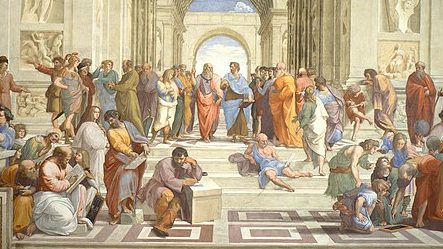The worst ideas of 5 great philosophers

- Some philosophers were so great that they will influence human thought forever.
- But even the world’s greatest philosophers had some really bad ideas.
- From Aristotle’s lazy cosmology to Immanuel Kant’s “scientific” racism, here are five of the worst ideas.
Some philosophers are so great that their ideas will influence human thought forever. However, this doesn’t mean that they were geniuses all the time. Here, we look at the worst ideas of five of the world’s greatest philosophers.
Plato: Flip-flopping sexism
Western philosophy has been described as a “series of footnotes to Plato.” His influence on human thinking is difficult to overstate. He wrote on just about everything, and his ideas influenced a wide range of fields, from Christianity to chemistry.
Plato’s best-known work is likely Republic, in which his teacher Socrates defines justice. Along the way, he describes the perfect city, the nature of the soul, and a story about a magic ring that turns the user invisible. While his Utopian city is a totalitarian nightmare, anybody who proved themselves capable could one day lead it as a philosopher-king — including women. He even argued that education must be identical for men and women if they are to use the same tools and do the same jobs.
This feminism, and for ancient Greece it was extremely radical, is expanded on in his work Laws. In that text, he proposes that souls — which are the important part of the individual — are genderless. As a result, when dealing with the rational part of a person, men and women should be fairly equal. Of course, people aren’t equally intelligent, but biological sex isn’t a factor.
However, his works are inconsistent in regard to the dignity and equality of women. This can be found even in Republic where, not far from where he writes that women are capable of running the perfect city, he argues that women seem to be worse than men at most activities. In Timaeus, a follow-up to Republic that discusses the physical world and introduces the story of Atlantis, Plato argues that cowardly men are reincarnated as women after death due to their behavior — hardly a flattering view. Across his works, he also generally deems women to be secretive, weaker, lesser, and emotional. On a more subtle note, Plato generally only depicts Socrates as having debates with men.
Emily Hulme Kozey of the University of Melbourne suggests that Plato could have observed that women tended to have fewer accomplishments than men in ancient Greece, and simply confused Athenian sexism with natural tendencies. In an article published in Feminist Studies, Christine Garside Allen suggests that Plato can be seen as consistent when the focus is shifted to the immortality of the soul and differences between males and females are seen as the result of their incarnations. In either case, the net result is still rather messy.
Aristotle: Lazy cosmology
Plato’s star student, the tutor of Alexander the Great, and the author of the first decent book on logic, Aristotle has a resume that few philosophers can match. While many of his ideas have gone by the wayside, a few of his ideas still have their supporters.
One idea that doesn’t have any supporters these days is his view on the cosmos. Aristotle placed the Earth at the center of the Universe, argued that all the planets were perfect, blemish-free objects, and that these objects moved around the Earth in perfect circles in their own fixed celestial planes.
Obviously, Aristotle lived a long time before modern astronomy, but his reasoning was particularly poor. Aristotle determined that the Earth was unmoving and that everything else must move around it by observing the locations of stars at different points in the year. He reasoned that if the Earth was moving, then the stars would appear slightly to shift locations in the sky as the Earth moved, a phenomenon known as parallax.
He was aware that the stars would appear not to move if they were very distant from a moving Earth. However, he dismissed the notion that the Universe was that large more or less out of hand. Aristotle also claimed that the Earth is the only place with life in the Universe because it is in the center and, therefore, special. This is circular reasoning: The conclusion that the Earth is special is used to prove that the Earth is special.
Immanuel Kant: “Scientific” racism
It is difficult to overstate how important Immanuel Kant is in philosophy. He wrote on virtually every topic that was available to him, he solved major problems in metaphysics and epistemology, and his ethics serve as the foundation for many modern ideas. However, he’s on this list for a reason, and that reason is “scientific” racism.
Kant based his argument on the medical theory of the humors, the idea that there are four vital fluids — blood, phlegm, yellow bile, and black bile — that illness was often caused by their falling out of balance, and that temperature and weather could influence these fluids. Based on these humors, Kant divided the world into four races. He argued that Whites enjoyed many advantages and that Native Americans and Africans were destined for slavery. He opposed interracial marriage, as he argued it would only turn out poorly for White people, and he mused how the superiority of the White race would lead it to survive the longest.
While this was not entirely unprecedented — a theory of personality based on the humors already existed — Kant’s notion was new and moved beyond any application or reinterpretation of humorism that existed. Toward the end of his life, Kant’s stances did change, and he began to consider the idea of different races having different moral statuses, though he was still rather biased in favor of Europeans. He also began to critique colonialism.
J.S. Mill: Privately managed imperialism
John Stuart Mill was an English philosopher, Member of Parliament, and economist during the 19th century. He is well known for his utilitarianism and commitment to liberal ideals.
In perhaps his most popular work, On Liberty, he argues for the importance of individual freedom from the state and societal domination. Only this, he argues, can allow for the full development of the individual and the cultivation of genius. He makes similar arguments in Considerations on Representative Government, but they are applied to political rather than social freedoms. Without self-governance and the freedom to choose a life path, he argues that the individual stagnates and cannot grow. A dynamic society requires that people be given liberty and democracy.
However, he doesn’t fully extend this notion to countries and peoples he didn’t think were ready for it. For example, in On Liberty, he argues that some countries should be governed with a “benevolent despotism” by more enlightened foreigners, since they were incapable of self-rule. Ostensibly, this would guide them toward a point in which they could rule themselves. He makes similar points in Considerations on Representative Government, where he explicitly suggests that China needs foreign rule to get it back on track to progress.
Though Kant strongly opposed slavery in the U.S., he was more ambivalent about its use elsewhere. Furthermore, as an opponent of the state doing things that individuals could do, he thought his old employer, the East India Company, should rule India instead of the British government. Later in life, he critiqued some of the company’s operations and questioned British colonialism.
Gottfried Leibniz: We live in the best of all possible worlds
Gottfried Leibniz, who co-invented calculus, devised mechanical calculators, and described designs for computers, had one stinker of a solution to the problem of evil: We dwell in the best of all possible worlds.
His argument essentially was that an all-powerful, all-knowing God could make any Universe that he wanted. If that God is also perfectly good — like the one Leibniz believed in — God would pick the best Universe possible to make. As a result, this Universe must be the best Universe that can exist.
Furthermore, Leibniz described evil as the absence of good. He posited that any evil that does exist is required for good to exist. For example, he argued that the contrast between good and evil made us better able to appreciate the good and thereby amplified it. If there was less evil, we would have less perceived good in the world. So, while the world has evil in it, it must also have the most good that is logically possible.
It wasn’t long before people realized that there is too much suffering in the world for this argument to seem sane. Voltaire, the French Enlightenment philosopher extraordinaire, caricatured Leibniz’s idea in his book Candide: It features a group of optimists enduring hardship after hardship while still pretending that Leibniz was right. Other philosophers have piled on as well. The Christian philosopher Alvin Plantinga pointed out that God could have tossed in one more righteous person, improving the world at low cost. Bertrand Russell argued that Leibniz’s argument is contradictory, as it implies that evil is both good and the lack of good.





